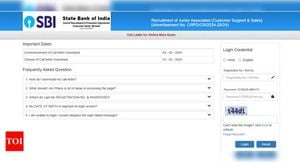In recent weeks, the Polish Ministry of Finance has issued urgent warnings about a surge in fraudulent activities targeting taxpayers. Scammers have been impersonating the ministry and local tax offices, sending out fake emails that claim recipients are entitled to overpayments on their Personal Income Tax (PIT).
According to the Ministry of Finance (MF), these scammers utilize deceptive emails and counterfeit websites, including podatki-pl.web.app and podatki-pl.firebaseapp.com, to steal sensitive taxpayer information. The ministry has highlighted that these fraudsters are not only sending emails but are also creating misleading websites designed to trick individuals into providing personal details.
In these emails, taxpayers are often asked to provide their PESEL number, passport number, mother's maiden name, and phone number, under the pretense that this information is necessary to access their tax refunds. "Taxpayers should not disclose personal information such as PESEL or bank account numbers," the ministry cautioned. "We also warn against sharing login details for the e-Tax Office or PINs for the e-Tax application."
In a related advisory, the ministry reiterated that it does not send emails requesting verification of PIT declarations or include links for confirmation of bank account details necessary for receiving refunds. This information was emphasized in a recent communication from the MF, which stated, "The Ministry of Finance and the National Fiscal Administration never notify about PIT declaration verification via email or send links in them."
Furthermore, taxpayers can verify any potential overpayment or underpayment resulting from their annual tax settlement directly through the e-Tax Office (e-US) at podatki.gov.pl. The ministry encourages individuals to log in using the government platform at login.gov.pl to track the status of their tax refunds securely.
Michał Deruś, a spokesperson for the Tax Administration Chamber in Lublin, provided further insights into the situation. He explained that these fraudulent messages could also involve attempts to extort money or personal data from unsuspecting taxpayers. "We advise anyone who receives suspicious messages to remain vigilant and report them to the appropriate authorities," Deruś stated.
The Ministry of Finance has made it clear that it is not the sender of such fraudulent messages and has urged the public to be cautious of any communications that appear to come from the ministry regarding alleged debts or tax overpayments.
As the tax season progresses, the ministry's warnings come at a critical time when many individuals are preparing their annual tax returns. The MF has reassured taxpayers that they can safely conduct their tax matters through the e-Tax Office, which offers a secure environment for managing tax affairs.
In addition to the email scams, the ministry has reported that some individuals have received fake notifications claiming they owe debts to the Ministry of Finance. These messages are designed to create panic and prompt recipients to provide personal information or make payments to the scammers.
Taxpayers are advised to look for red flags when receiving unexpected emails or messages. Legitimate communications from the Ministry of Finance will not ask for sensitive personal information or direct recipients to click on links for verification purposes.
In light of these developments, the ministry encourages taxpayers to familiarize themselves with the official channels for checking their tax statuses and to remain cautious of unsolicited communications. "Be proactive in protecting your personal information," the ministry urged, emphasizing the importance of vigilance against such scams.
As the situation evolves, the Ministry of Finance continues to monitor these fraudulent activities and is working closely with law enforcement to address and combat these scams. The ministry's ongoing efforts aim to safeguard taxpayer data and ensure that individuals can navigate their tax responsibilities without falling victim to fraud.
In summary, the recent rise in scams targeting taxpayers in Poland underscores the importance of being cautious and informed. The Ministry of Finance is taking steps to alert the public and provide guidance on how to recognize and avoid these fraudulent schemes. As the tax season unfolds, taxpayers are encouraged to utilize the e-Tax Office for secure transactions and to report any suspicious activity to the authorities.




